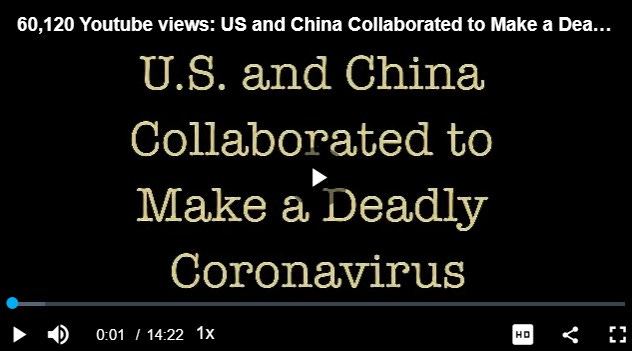2015 Scientific Paper Proves US & Chinese Scientists Collaborated to Create Coronavirus that Can Infect Humans
A Special Report by Peter R. Breggin, MD Published April 15, 2020
[This video and report were published April 15, 2020. Just one month after the lockdowns were first announced.]
A Special Report Published April 15, 2020 by Peter R. Breggin MD
In 2015, American researchers and Chinese Wuhan Institute of Virology researchers collaborated to transform an animal coronavirus into one that can attack humans. Scientists from prestigious American universities and the US Food and Drug Administration (FDA) worked directly with the two coauthor researchers from Wuhan Institute of Virology, Xing-Yi Ge and Zhengli-Li Shi. Funding was provided by the Chinese and US governments. The team succeeded in modifying a bat coronavirus to make it capable of infecting humans.
The research was published in December 2015 in the prestigious British journal, Nature Medicine (volume 21, pages1508–1513). The paper by Vineet D. Menachery et al., “A SARS-like cluster of circulating bat coronaviruses shows potential for human emergence” is available here as a PDF as well as on-line.
Footnotes to the scientific paper disclose that the research was funded by both the Chinese and US Governments, including grants from the NIH’s National Institute of Allergy & Infectious Disease.
Footnotes also document that the two Chinese researchers were active in their own laboratories as part of this coronavirus project.
At the bottom of the first page, the affiliation of both Chinese coauthors is listed as “Key Laboratory of Special Pathogens and Biosafety, Wuhan Institute of Virology, Chinese Academy of Sciences, Wuhan, China.” The Chinese were being aided by the American government, American universities and American researchers in developing a potential military weapon with the capacity to cause a pandemic intentionally or accidentally.
Multiple prestigious American researchers and institutions were involved. One is from the FDA’s National Center for Toxicological Research in Jefferson, Arkansas. The first author of the article, Vineet Menachery, is from the Department of Epidemiology, University of North Carolina at Chapel Hill. Several other authors are from the University of North Carolina and one is from Harvard Medical School. There is also a Swiss researcher.
The researchers themselves note in the text of the article that the risks associated with the creation of their human pathogen were significant. They openly wondered if their research compromised U.S. federal standards for research on dangerous pathogens.
The potential dangers of the creation of new human coronavirus pathogens in the American/Chinese Menachery research were discussed in a commentary by Jef Akst in The Scientist on November 16, 2015. However, the danger of the Chinese collaboration went unmentioned.
Concluding Questions:
In 2015, US researchers in collaboration with Chinese researchers from the now-infamous Wuhan Institute jointly published a paper describing how they successfully modified a bat coronavirus to make it capable of infecting humans. Their project was funded by both the Chinese and the American governments.
Who in the US government enabled this research? Why was it allowed when it was enabling the Chinese to develop a military weapon or to accidentally cause an epidemic?
Why was an FDA official involved as an author and why was NIH funding the project?
The virus created in collaboration with the Chinese and the current epidemic virus are both SARS-CoV with many shared characteristics. This writer has found no scientific research that specifically compares the two viruses, a subject that needs to be investigated.
How many more lab-created or manipulated viruses are in the world’s laboratories and under the control of governments and the military?
Are potentially dangerous research projects continuing to go on involving American and Chinese collaboration with or without funding from both countries?
Why and how has this research project wholly escaped notice amid the growing concern about China’s role in causing the ongoing novel coronavirus pandemic?
Why have none of the American researchers come forward to draw attention to this project which, at the least, enabled and promoted Chinese efforts to weaponize viruses?
Resources:
The Menachery et al. (2015) scientific paper was found by my wife Ginger Breggin while following scientific discussions on-line that led her to the critique in The Scientist and then to the article.
COVID-19 and the Global Predators: We are the Prey was authored and published in September 2021 by Peter R. Breggin MD and Ginger Breggin.
The original publication of the video and the written blog by Peter R. Breggin MD:
https://breggin.com/article-detail/post_detail/us-chinese-scientists-collaborate-on-coronavirus
Editors’ note: The original video, first published on YouTube on April 15, 2020 was eventually cancelled along with Dr. Breggin’s whole Youtube Channel. Before cancellation this single video had been viewed over 60,120 times on Youtube in a matter of days. The Breggins’ discovery of this paper and the malfeasance of the United States and the Communist Chinese administrations launched them on an investigation that resulted in the publication of one of the earliest and most in-depth books exposing the reasons for and many of the sources behind what was called the COVID pandemic: COVID-19 and the Global Predators: We are the Prey.
Find us at X— formerly known as Twitter: @GingerBreggin @AmericanMD
Find us at our website: www.Breggin.com
Find us at www.AmericaOutLoud.com
Find us on Substack at: Breggin Alerts! Exposing Global Predators
Breggin Alerts! Exposing Global Predators is a reader-supported publication. To receive new posts and support our work, consider becoming a free or paid subscriber.

No comments:
Post a Comment